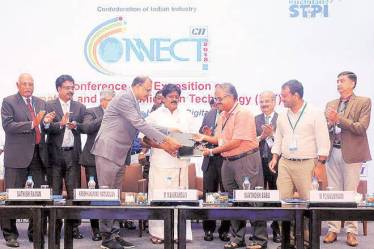In yet another step towards achieving the goal of paperless services in the state, the Tamil Nadu government has tied up with IIT Madras for enhancing the data-driven governance. The Robert Bosch Centre for Data Science and AI at IIT Madras through Tamil Nadu e-Governance Agency (TNeGA) has agreed to support the Tamil Nadu government on various data science and ICT-related challenges. This will be carried out by working closely with various agencies and entities within the government of Tamil Nadu. These collaborations are expected to contribute towards various aspects of governance, including in but not limited to education, healthcare, and agriculture.
Speaking about the importance of this project, Nandan Sudarsanam, assistant professor, department of management studies, IIT Madras said, “Societal impact through Artificial Intelligence (AI) is a central objective of RBC-DSAI at IIT Madras. We believe that by teaming up with the TNeGA we can contribute towards multiple pillars of the government, covering areas such as education, healthcare, and agriculture.”
Read also| With adoption to newer technologies, cybersecurity will continue to be a matter of concern: Unisys MD
The collaboration seeks to take up five channels for engagement. The foremost thing is to support and collaborate on research relating to data science for government and e-governance. Under the mandate, through specific projects, the parties will develop products, decision-support systems and provide insights from data. Then, focus would be given to capacity building in the areas of data science and information and communications technology (ICT) for the government of Tamil Nadu. Also, the collaboration will conduct periodic Hackathons and workshops involving students in the areas of data science and ICT. Finally, it will work towards creation of registered entities, potentially in collaboration with external IT vendors to carry forward projects at a larger scale.
Santhosh K Misra, CEO, TNeGA, said, “Today, governance needs to move from demand mode of service delivery to predictive mode of service delivery. Governments need to tap the power of AI, Internet of Things (IoT), Blockchain and drones in addressing the needs of their citizens. Tamil Nadu government is the first state government to collaborate with a premier research institute such as IIT-M for harnessing the power of AI and Blockchain in areas of health, education and agriculture.”
Speaking about the project, B Ravindran, head, Robert Bosch Centre for Data Science and AI, IIT Madras, said, “RBC DSAI is an interdisciplinary centre for research in AI, and hence is uniquely positioned to effectively engage with multiple departments of the government.”
IIT Madras established the Robert Bosch Centre for Data Science and Artificial Intelligence (RBC-DSAI) to create societal impact through multidisciplinary interactions with government, academic, research and industrial collaborators on core challenges in data science and AI. It seeks to undertake foundational research in many areas of AI and data science, namely, deep learning, reinforcement learning, network analytics, interpretable machine learning, and domain aware AI.
TNeGA is the state nodal agency formed under the information technology department to support and drive all e-governance initiatives of the Tamil Nadu government. Earlier in the year, Tamil Nadu government had released its new e-governance policy aiming to offer all services online by 2023.
